逐句精讲新概念英语第二册第20课独坐孤舟
- 格式:docx
- 大小:20.18 KB
- 文档页数:6
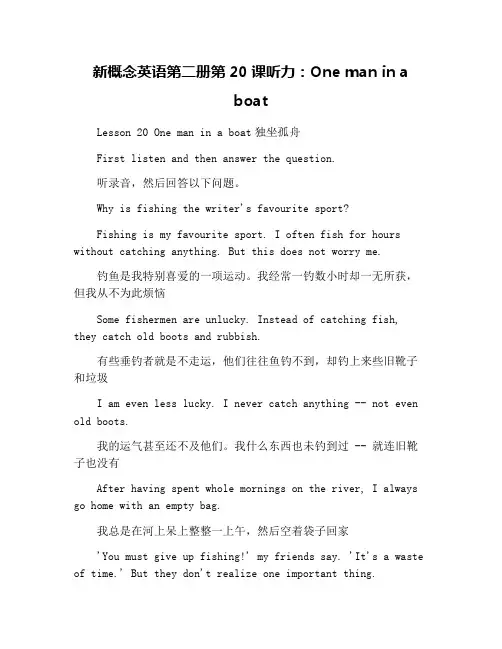
新概念英语第二册第20课听力:One man in aboatLesson 20 One man in a boat独坐孤舟First listen and then answer the question.听录音,然后回答以下问题。
Why is fishing the writer's favourite sport?Fishing is my favourite sport. I often fish for hours without catching anything. But this does not worry me.钓鱼是我特别喜爱的一项运动。
我经常一钓数小时却一无所获,但我从不为此烦恼Some fishermen are unlucky. Instead of catching fish, they catch old boots and rubbish.有些垂钓者就是不走运,他们往往鱼钓不到,却钓上来些旧靴子和垃圾I am even less lucky. I never catch anything -- not even old boots.我的运气甚至还不及他们。
我什么东西也未钓到过 -- 就连旧靴子也没有After having spent whole mornings on the river, I always go home with an empty bag.我总是在河上呆上整整一上午,然后空着袋子回家'You must give up fishing!' my friends say. 'It's a waste of time.' But they don't realize one important thing.“你可别再钓鱼了!”我的朋友们说,“这是浪费时间。
”不过他们没有理解到重要的一点I'm not really interested in fishing. I am onlyinterested in sitting in a boat and doing nothing at all!我并不是真的对钓鱼有兴趣,我感兴趣的仅仅独坐孤舟,无所事事!New words and Expressions生词和短语catchv. 抓到fishermann. 钓鱼人,渔民bootn. 靴子wasten. 浪费realizev. 意识到Notes on the text课文注释1 Fishing is my favourite sport.钓鱼是我最喜欢的一项运动。
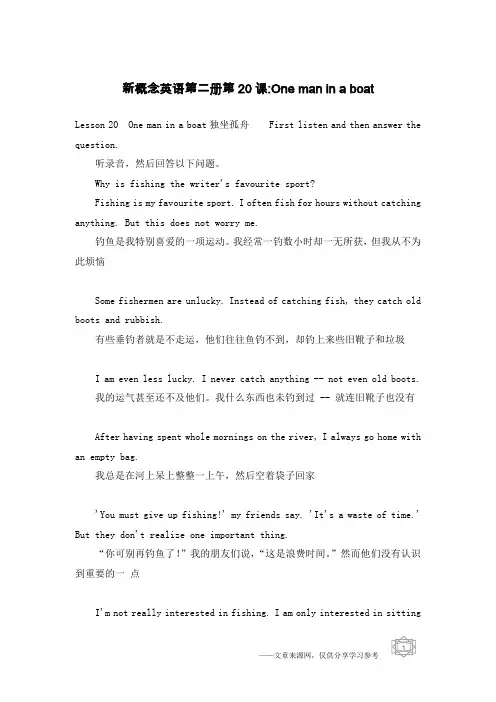
新概念英语第二册第20课:One man in a boatLesson 20 One man in a boat独坐孤舟First listen and then answer the question.听录音,然后回答以下问题。
Why is fishing the writer's favourite sport?Fishing is my favourite sport. I often fish for hours without catching anything. But this does not worry me.钓鱼是我特别喜爱的一项运动。
我经常一钓数小时却一无所获,但我从不为此烦恼Some fishermen are unlucky. Instead of catching fish, they catch old boots and rubbish.有些垂钓者就是不走运,他们往往鱼钓不到,却钓上来些旧靴子和垃圾I am even less lucky. I never catch anything -- not even old boots.我的运气甚至还不及他们。
我什么东西也未钓到过 -- 就连旧靴子也没有After having spent whole mornings on the river, I always go home with an empty bag.我总是在河上呆上整整一上午,然后空着袋子回家'You must give up fishing!' my friends say. 'It's a waste of time.' But they don't realize one important thing.“你可别再钓鱼了!”我的朋友们说,“这是浪费时间。
”然而他们没有认识到重要的一点I'm not really interested in fishing. I am only interested in sittingin a boat and doing nothing at all!我并不是真的对钓鱼有兴趣,我感兴趣的只是独坐孤舟,无所事事!New words and Expressions生词和短语catchv. 抓到fishermann. 钓鱼人,渔民bootn. 靴子wasten. 浪费realizev. 意识到Notes on the text课文注释1 Fishing is my favourite sport.钓鱼是我最喜欢的一项运动。
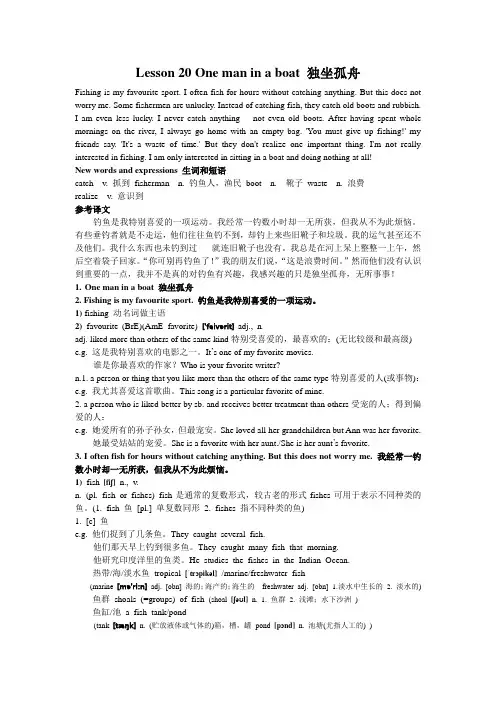
Lesson 20 One man in a boat 独坐孤舟Fishing is my favourite sport. I often fish for hours without catching anything. But this does not worry me. Some fishermen are unlucky. Instead of catching fish, they catch old boots and rubbish.I am even less lucky. I never catch anything -- not even old boots. After having spent whole mornings on the river, I always go home with an empty bag. 'You must give up fishing!' my friends say. 'It's a waste of time.' But they don't realize one important thing. I'm not really interested in fishing. I am only interested in sitting in a boat and doing nothing at all!New words and expressions 生词和短语catch v. 抓到fisherman n. 钓鱼人,渔民boot n. 靴子waste n. 浪费realize v. 意识到参考译文钓鱼是我特别喜爱的一项运动。
我经常一钓数小时却一无所获,但我从不为此烦恼。
有些垂钓者就是不走运,他们往往鱼钓不到,却钓上来些旧靴子和垃圾。
我的运气甚至还不及他们。
我什么东西也未钓到过-- 就连旧靴子也没有。
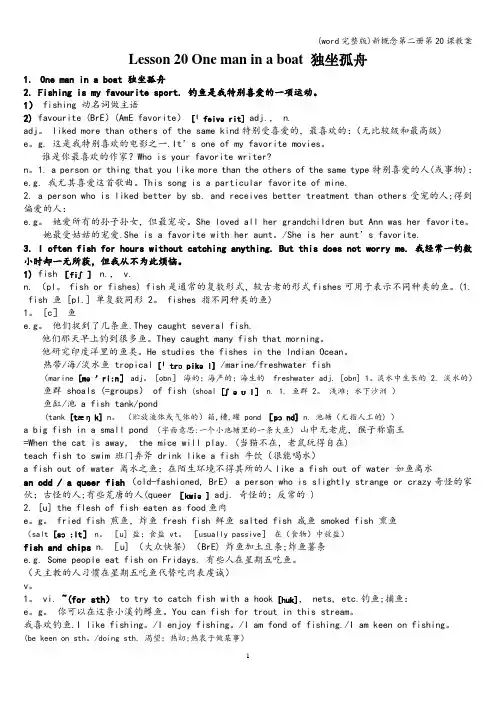
Lesson 20 One man in a boat 独坐孤舟1.One man in a boat 独坐孤舟2. Fishing is my favourite sport. 钓鱼是我特别喜爱的一项运动。
1)fishing 动名词做主语2) favourite(BrE)(AmE favorite)[ˈfeivərit]adj., n.adj。
liked more than others of the same kind特别受喜爱的,最喜欢的:(无比较级和最高级)e。
g. 这是我特别喜欢的电影之一.It’s one of my favorite movies。
谁是你最喜欢的作家?Who is your favorite writer?n。
1. a person or thing that you like more than the others of the same type特别喜爱的人(或事物):e.g. 我尤其喜爱这首歌曲。
This song is a particular favorite of mine.2. a person who is liked better by sb. and receives better treatment than others受宠的人;得到偏爱的人:e.g。
她爱所有的孙子孙女,但最宠安。
She loved all her grandchildren but Ann was her favorite。
她最受姑姑的宠爱.She is a favorite with her aunt。
/She is her aunt’s favorite.3. I often fish for hours without catching anything. But this does not worry me. 我经常一钓数小时却一无所获,但我从不为此烦恼。
1) fish[fiʃ] n., v.n. (pl。
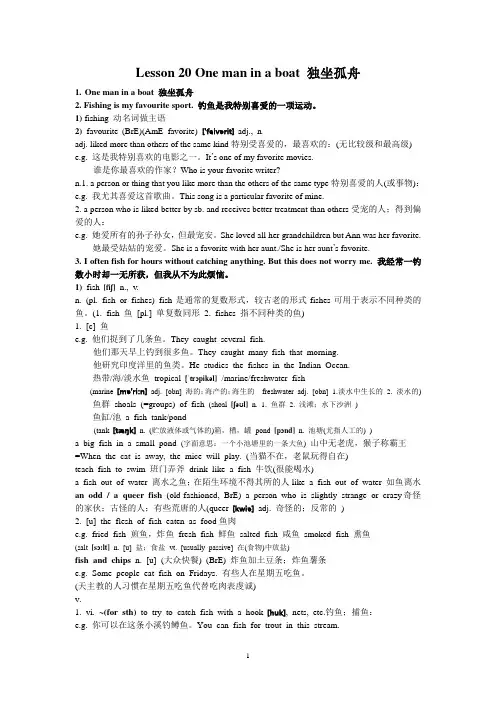
Lesson 20 One man in a boat 独坐孤舟1.One man in a boat 独坐孤舟2. Fishing is my favourite sport. 钓鱼是我特别喜爱的一项运动。
1) fishing 动名词做主语2) favourite(BrE)(AmE favorite)[ˈfeivərit]adj., n.adj. liked more than others of the same kind特别受喜爱的,最喜欢的:(无比较级和最高级) e.g. 这是我特别喜欢的电影之一。
It’s one of my favorite movies.谁是你最喜欢的作家?Who is your favorite writer?n.1. a person or thing that you like more than the others of the same type特别喜爱的人(或事物):e.g. 我尤其喜爱这首歌曲。
This song is a particular favorite of mine.2. a person who is liked better by sb. and receives better treatment than others受宠的人;得到偏爱的人:e.g. 她爱所有的孙子孙女,但最宠安。
She loved all her grandchildren but Ann was her favorite.她最受姑姑的宠爱。
She is a favorite with her aunt./She is her aunt’s favorite.3. I often fish for hours without catching anything. But this does not worry me. 我经常一钓数小时却一无所获,但我从不为此烦恼。
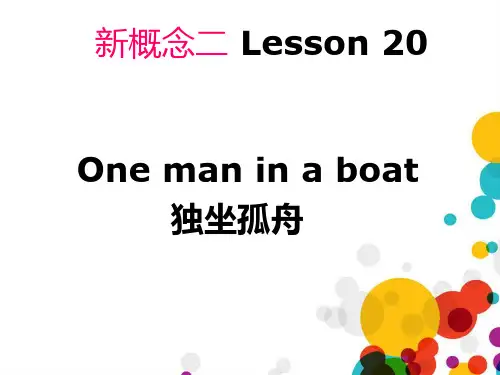
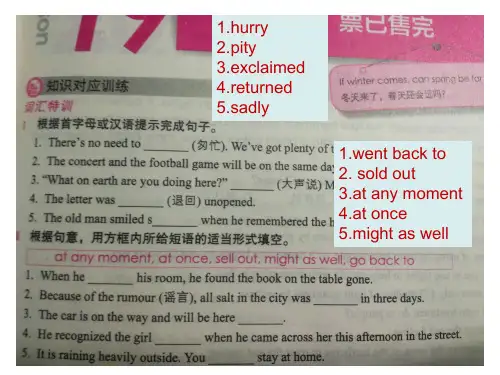
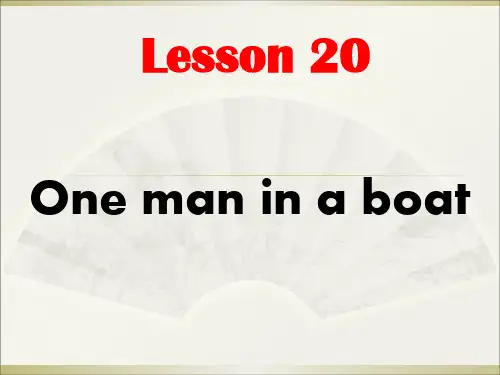
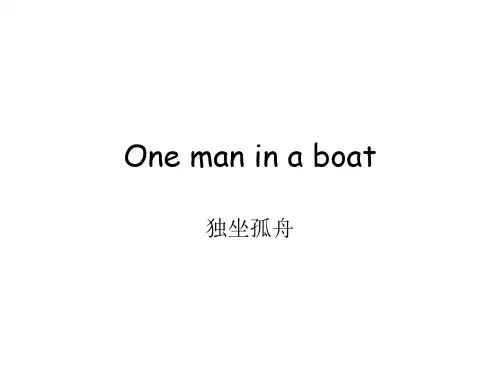
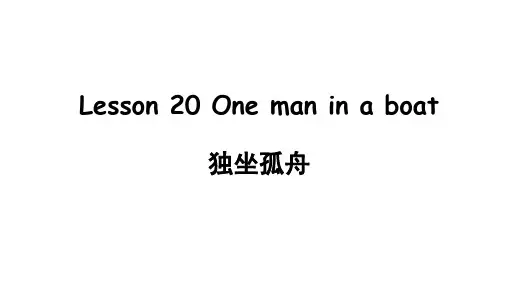
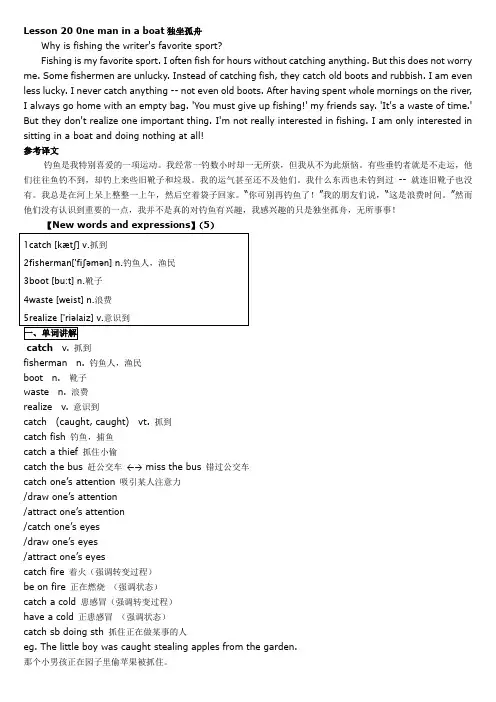
Lesson 20 0ne man in a boat独坐孤舟Why is fishing the writer's favorite sport?Fishing is my favorite sport. I often fish for hours without catching anything. But this does not worry me. Some fishermen are unlucky. Instead of catching fish, they catch old boots and rubbish. I am even less lucky. I never catch anything -- not even old boots. After having spent whole mornings on the river, I always go home with an empty bag. 'You must give up fishing!' my friends say. 'It's a waste of time.' But they don't realize one important thing. I'm not really interested in fishing. I am only interested in sitting in a boat and doing nothing at all!参考译文钓鱼是我特别喜爱的一项运动。
我经常一钓数小时却一无所获,但我从不为此烦恼。
有些垂钓者就是不走运,他们往往鱼钓不到,却钓上来些旧靴子和垃圾。
我的运气甚至还不及他们。
我什么东西也未钓到过-- 就连旧靴子也没有。
我总是在河上呆上整整一上午,然后空着袋子回家。
“你可别再钓鱼了!”我的朋友们说,“这是浪费时间。
【导语】新概念英语作为家喻户晓的经典之作,它有着全新的教学理念,有趣的课⽂内容及其全⾯的技能训练,为⼴⼤的英语学习者提供帮助!如果你也想学好英语,⼜怎能错过新概念英语?下⾯为您提供了相关内容,希望对您有所帮助!新概念英语2逐句精讲Lesson19 1.‘The play may begin at any moment,' I said.‘It may have begun already,' Susan answered. “戏马上就要开演了,”我说。
“说不定已经开演了呢”苏姗回答说。
语⾔点⽐较学习: must be (可能性⼤):He must be a teacher. 他很可能是⼀名教师。
may be (可能性稍⼩):He may be a teacher.他也许是⼀名教师。
2.‘I hurried to the ticket-office.'May I have two tickets please ?' I asked. 我匆匆赶到售票处,问:“我可以买两张票吗?” 语⾔点 hurry to somewhere指匆忙赶到某地,如果想催促某⼈“快点”,可以这样说:Come on.赶快。
/ Hurry!快点!/ You’re too slow.你太慢了。
/ Can you go any faster? 你能⾛快点吗?/ We are running out of time.没时间了 ! 当回答某⼈的催促时,通常这样说: Hold on. / Wait a minute.稍候。
/ I’m hurrying.我正在赶。
/ What’s the hurry?你着什么急啊? / I’m trying.我⼀直在尽⼒。
/Just give me a second, Fm almost done.再等⼀下,我快做完了。
3.‘I'm sorry, we've sold out,' the girl said. “真对不起,我们的票已经卖完了。
逐句精讲新概念英语第二册:第20课独坐孤舟Lesson20 One man in a boat课文内容:Fishing is my favourite sport. I often fish for hours without catching anything. But this does not worry me. Some fishermen are unlucky. Instead of catching fish, they catch old boots and rubbish.I am even less lucky. I never catch anything-not even old boots.After having spent whole mornings on the river, I always go home with an empty bag. ‘You must give up fishing!' my friends say.‘It's a waste of time.' But they don't realize one important thing. I'm not really interested in fishing. I am only interested in sitting in a boat and doing nothing at all !本文语法:动名词语法归纳:动名词由“V + ing”构成,是兼有动词和名词一部分性质的非谓语动词,可以通俗地理解为表达动词的含义而具有名词的词性。
动名词在句子中可充当主语、宾语、表语、定语等:1)动名词作主语:Saving is having.节约就是财富。
Finding a good job is very difficult now.现在找一个好工作很难。
逐句精讲新概念英语第二册第20课独坐孤舟逐句精讲新概念英语第二册:第20课独坐孤舟Lesson20 One man in a boat课文内容:Fishing is my favourite sport. I often fish for hours without catching anything. But this does not worry me. Some fishermen are unlucky. Instead of catching fish, they catch old boots and rubbish.I am even less lucky. I never catch anything-not even old boots.After having spent whole mornings on the river, I always go home with an empty bag. ‘You must give up fishing!' my friends say.‘It's a waste of time.' But they don't realize one important thing. I'm not really interested in fishing. I am only interested in sitting in a boat and doing nothing at all !本文语法:动名词语法归纳:动名词由“V + ing”构成,是兼有动词和名词一部分性质的非谓语动词,可以通俗地理解为表达动词的含义而具有名词的词性。
动名词在句子中可充当主语、宾语、表语、定语等:1)动名词作主语:Saving is having.节约就是财富。
Finding a good job is very difficult now.现在找一个好工作很难。
Watching television is a waste of time.看电视就是在浪费时间。
2)动名词作宾语:I am interested in dancing and travelling.我对跳舞和旅行很感兴趣。
She was afraid of making mistakes.她害怕犯错误。
3)动名词作表语:His job was testing voice of the movie.他的工作是测试电影的声音。
(testing在此并不构成进行时态)对比:He was testing voice of the movie.他当时真在测试电影的声音。
(was testing为过去进行时)4)动名词作定语:peace-keeping police 维和警察;fact-finding committee 调查委员会逐句精讲:1.Fishing is my favourite sport.钓鱼一直是我最喜欢的一项运动。
.语言点1 fishing在此是动名词,是典型的动名词作主语的用法:超级模仿:Running / Growing flowers / Learning is my favorite thing. 跑步/种花/学习是我最喜欢做的事。
Learning English is not easy.学英语并非是件简单的事。
语言点2 对比英式英语和美式英语的拼与方式:特别喜欢的:fevourite (英);favorite (美).赞成;宠爱:fevour (英);favor (美)幽默,恢谐:humour (英);humor (美)行为,举止:behaviour (英);behavior (美)2.I often fish for hours without catching anything.我经常一钓数小时却一无所获。
语言点1 fish在此不是名词而作实义动词,意为“钓鱼”。
语畜点2 “for +段时间”表示经过了多长时间:for hours数小时;for three months三个月;for years 几年:I haven’t heard from him for years. 我好几年没收到他的来信了。
语言点3 总结语法:介词后常接名词、动名词和代词。
without prep. 无,没有(with的否定形式);without +名词,大多数表示条件或伴随状况:We will go to the cinema without you.我们将去电影院,但不带你去。
She went out immediately without saying a word.她一句话没说就立刻走出去了。
3.But this does not worry me.但我从来不为此而烦恼。
语言点 worry的用法小结:1) 作及物动词,worry sb. / sth.令某人烦恼;担心某事Don't wony me with such foolish questions.不要用这些愚蠢的问题烦我。
2) 作不及物动词,worry about sb. / sth.为某人/某物而担心Don’t wony about trifles.不要为小事烦恼。
(trifle 琐事)3) 作名词:She always has a lot of worries.她有很多烦恼的事。
4) worry,upset都有“使烦恼”的意思,它们只是意思相近,具体用法还有区别。
worry的同义词为annoy; upset的同义词为overturn。
You’ll upset your stomach if you eat too much rich food.你如果吃太多的油腻食物,胃就会很不舒服的。
4.Some fishermen are unlucky.有些垂钓者就是不走运。
语言点1 some fishermen为复数主语,系动词用are符合主谓一致原则。
语言点2 unlucky中“-un”为否定前缀。
前缀改变词义,加否定前缀一般将单词变成其否定形式:unligtted未被点燃的;unlike不同的;unlimited无限的;unlicensed未经许可的;unknown 不知道的;unkind无情的5.Instead of catching fish, they catch old boots and rubbish.他们往往钓不到鱼,却钓上来一些旧靴子和垃圾。
语言点“instead of+名词”意思是“代替某人/某物”。
I did this work instead of my brother.我替我弟弟完成了这份工作。
Instead of being a doctor, he joined the army. 他原本是要当一名医生的,结果却去参军了。
He was watching TV instead of doing homework. 他本应该做作业,结果却在看电视。
特别注意:1) instead of在句子中的位置可前可后;原句可变为:They catch old boots and rubbish instead of catching fish.2) instead of后面一定要接名词、代词或动名词。
6.I am even less lucky.我的运气甚至还不如他们。
语言点1 even意为“甚至”,表示强调。
Even now learning English is not too late.甚至现在想学习英语也还不晚。
It’s even colder than yesterday.今天甚至比昨天还要冷。
语言点2 less意为“少的,较小的,” little(很少的)的比较级。
many, much的比较级为more.7.I never catch anything-not even old boots.我什么都没有钓到过——甚至连旧靴子也没有。
语言点1 never表示一点可能都没有,程度比一般否定要深。
对比学习:I do not love you. 我不爱你。
I never love you.我从没爱过你。
(—点可能性都没有)语言点2 英语中破折号(dash)后为补充说明内容,在此进一步补充说明前面的anything。
8.After having spent whole mornings on the river, I always go home with an empty bag.我总是在河上待过整整一上午,然后空着袋子回家。
语言点1 after having spent和after spending意思是“在度过……以后”,前者多用在书面语中多用在口语中,为简洁的表达法。
语言点2 with “和,带着”,表伴随;I went out with enough money. 我带着足够的钱出门了。
/He often goes to school with his sister. 他经常和姐姐一块去上学。
9.‘You must give up fishing!' my friends say.“你可別再去钓鱼了!”我的朋友们说。
语言点1 复习must的用法:1) We must obey orders. 我们必须服从命令。
2) must be 肯定是:We must be very tired after working a whole day. 工作了一天你肯定非常累了。
语言点2 1) give up放弃;认输;戒掉;不再做:give up smoking戒烟;give up drinking戒酒;give up eating 节食2) give oneself up= surrender to 投降The suspects gave themselves up.这些嫌疑犯投降了。
2) (口语)What gives? =What’s wrong? =What’s the matter?发生什么事了?10.‘It's a waste of time.'“那简直就是在浪费时间。
”语言点 it is句型,意思是“它是……”。
It’s a book of mine = It’s my book.它是我的书。
11.But they don't realize one important thing.但是他们没有意识到重要的一点。
语言点don’t realize意为“没有意识到”,即“忽略”,相当于ignore / neglect原句可改为:But they ignore one important thing.12.I'm not really interested in fishing.我并不是真的对钓鱼有兴趣。